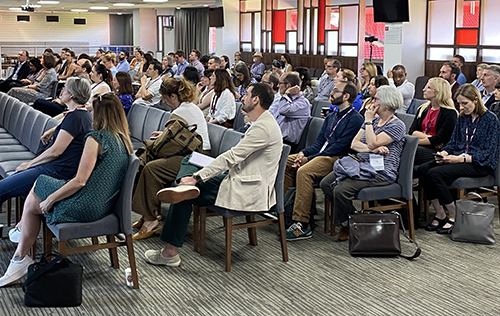Bionow’s 2025 Neuroscience conference tackles the challenge of combining expertise, funding and new technologies

Another exciting agenda full of talks, panels and networking covered a range of themes, including translational neuroscience and commercialisation; patient perspectives; psychiatric disorders; drug delivery to the brain; and rare conditions, alongside keynote presentations, networking and the conference poster competition.
Two keynote speakers shared their experience and expertise: Simon Stott, Director of Research at Cure Parkinson’s, and Professor Fiona Ducotterd, Chief Scientific Officer of the Alzheimer’s Research UK (ARUK) Drug Discovery Institute at UCL (UDDI).
Simon Stott’s keynote presentation showcased the international Linked Clinical (iLCT) initiative, a collaborative treatment selection and clinical trial program led by Cure Parkinson's and the Van Andel Institute, which was developed around the topic of urgency, specifically how Cure Parkinson’s could speed up the development of new disease modifying therapies for Parkinson’s. Running for 13 years, the iLCT initially focused on drug repurposing, but this focus is shifting towards de-risking new chemical entities, with the programme associated with 20 active trials involving over 3,300 people with Parkinson’s, 17 of which are using iLCT evaluated drugs, and 21 completed trials, of which 15 used iLCT evaluated drugs and involved nearly 1,500 Parkinson’s patients.
Key findings from the iLCT programme included the importance of dossier scoring and feedback, with multifaceted scoring providing richer, more added-value feedback for stakeholders; accelerating the process by providing a mechanism for commissioning research that needs to be done to strengthen the case for support; the consideration that drug repurposing is not easy or fast, with agents often requiring reformulation or dose finding studies; and intellectual property and regulatory pathways both presenting challenges.
Looking to the future, the programme has multiple areas of focus, namely Multi-Arm, Multi-Stage (MAMS) trial platforms for international efforts; cross disease indication collaborations in areas such as Alzheimer’s research where there is overlapping biology with Parkinson’s; and combination therapies where monotherapies are not effective enough.
Professor Fiona Ducotterd’s keynote examined the translation of academic discoveries into treatments for neurodegenerative diseases, with the aim of the Alzheimer’s Research UK Drug Discovery Alliance to rapidly translate new, evidence-based scientific discoveries into potential treatments.
With dementia prevalent in 10-30% in the population over 65 years of age, affecting 50M people worldwide and 900,000 in the UK and with Alzheimer’s disease accounting for 60-80% of dementia cases, it was stated that to find a cure, a toolbox of treatments for underlying causes was required, along with identifying biomarkers to understand the right treatment for the right patient at the right time. Progress in this area was also looked at, with limited treatment options for symptoms, limited molecular tools to probe underlying disease biology across dementias, and the inability to identify the type of dementia in living patients presenting obstacles in the past, and the current landscape revealing the increase in the availability of disease modifying therapies (anti-amyloid immunotherapies), a growing understanding of targets and disease mechanisms, increased genomic insights, and advances in biomarker research. The future of dementia research points to more treatments that target more disease mechanisms, along with better biomarkers, earlier detection and improved precision to allow personalised treatment plans.
On the day we were pleased to announce that the winner of the poster competition, with 18 entrants, was Freya Bunting, Prof Arshad Majid and Dr Milena De Felice at the University of Sheffield with their abstract titled Post-stroke pain: Carnosine modulation of central and peripheral mechanisms, which was collected by Dr Milena De Felice. Congratulations!
Honourable mentions go to runners-up the Geoffrey Jefferson Brain Research Institute at the University of Manchester with their abstract titled Acute ACE-inhibitor treatment as a potential drug candidate for neuroprotection after intracerebral haemorrhage, and the team at ApconiX for their poster on seizure liability in drug development.
We would also like to extend a thank you to our patient perspective speaker on the day, Shaun Flores, who spoke with such courage and insight into the realities of living with OCD, an often misunderstood neurological condition, and how he is using that experience to help others through his role as a Mental Health, DEI, Neurodiversity & Masculinity Advocate at Orchard OCD.
Bionow’s CEO, Geoff Davison, commented: “We’re thrilled with the continued positive response to this event after the success of last year. It was fantastic to hear such a wide range of perspectives throughout the day. Bringing together experts, funders, and cutting-edge technologies is key to driving progress in neuroscience, helping us move closer to breakthrough therapies and better outcomes for patients. That’s exactly why this conference plays such an important role.”
The 2025 Neuroscience conference was sponsored by ApconiX and the University of Sheffield.





















